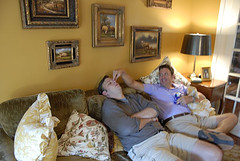
flickr.com/cgallent
There’s a reason that snoring sounds like a trumpet blast. It’s because your sinuses are air filled cavities located behind your eyes, nose cheeks and forehead. Sinus cavities are lined with mucous-secreting membranes and connected to the nasal cavity behind the nose by a series of narrow channels.
Sinusitis is the inflammation of the sinuses. This condition can be chronic (long term) or acute (rapid onset and equally rapid improvement with or without treatment).
Kids less than 5 years of age are rarely affected by sinusitis, as their sinuses are not fully developed. When young children snore, it’s almost always caused by enlarged tonsils and adenoids.
Sinusitis causes snoring when inflammation affects the nasal cavity and airways.
Sinusitis is usually caused by a viral infection, most often a common cold. The channels connecting the nose and the sinuses will become blocked, so the mucous is unable to drain from the sinuses. Mucous collects and becomes infected.
When other conditions are present, such as nasal polyps or allergic rhinitis, blockage of the sinus channels is more likely to occur. Those who have had the misfortune of having their noses reshaped through accident or misadventure may suffer worse sinusitis because of a deviated nasal septum (the cartilage wall that divides the nostrils).
People who suffer with the genetic condition cystic fibrosis also tend to be more prone to developing sinusitis.
The symptoms of sinusitis can be easy to spot:
* headaches
* tenderness around the face with a feeling of heaviness and pain in the facial tissues when leaning down
* toothaches
Sleep better! Check out the world's Best MATTRESS TOPPER.
* discoloured discharge
* stuffy nose
* excessive snoring
Sinusitis often clears up without medical intervention and the snoring problem eases as the inflammation and infection reduces.
In the meantime, you can use over the counter painkillers and decongestants to alleviate your symptoms. Steam inhalation can also bring relief. See your doctor if sinusitis persists for more than 3 days.
If your sinuses are badly infected your doctor may prescribe a course of antibiotics. Persistent or recurrent infections may require further testing to check for other health conditions that may be blocking the drainage channels between the nasal and sinus cavities. These tests will check for the possibility of polyps or tumors.
The nature of anatomy of the nose and sinuses dictate that, if an infection sets in and is not treated promptly, it can persist. Bacteria causing the infection have many places to hide, and they can lurk within the warm moist atmosphere of the sinus cavities. It is not unusual to experience a recurrence of sinusitis.
There’s more to sinusitis than just snoring, so the condition needs to be treated promptly and appropriately. You’ll take care of a nasty infection, and everyone will sleep a little easier.
Which one of these is this the world's best foam mattress?
Candidate "A"
Candidate "B" -- you decide 🙂
Tagged with: sinus • sinusitis
Filed under: Snoring